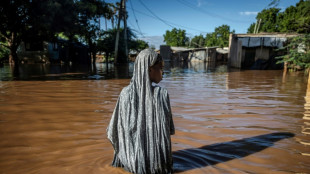

UN talks look for deal on winding down fossil fuels
Negotiators were searching for a compromise on phasing out fossil fuels at UN climate talks Friday as momentum gathered to strike an historic deal in Dubai.
After the arrival of ministers for the summit's final stretch, a new draft was released with more options on the most difficult part of an emerging deal -- cutting fossil fuels to tame the planet's soaring temperatures.
The third version of the draft, which represents views of various countries, offers five options, including not mentioning fossil fuels at all.
Other options include phasing out "unabated" fossil fuels -- those whose emissions cannot be captured -- with a goal of peaking consumption this decade and aiming for the world's energy sector to be "predominantly free of fossil fuels well ahead of 2050".
A new line calls for ramping up renewable energy to displace fossil fuels -- oil, gas and coal -- with a goal of "significantly reducing global reliance on non-renewable and high-emission energy sources".
The language is in line with an agreement between the United States and China, the world's top emitters of greenhouse gases, at talks in California last month.
COP28 president Sultan Al Jaber wants to wrap up the talks on schedule at 11 am (0700 GMT) on Tuesday, which means that all the nearly 200 nations will have to come to a consensus.
"We have the potential to deliver a paradigm shift," he said.
"Let us please get this job done. I need you to step up and I need you to come out of your comfort zones," he said.
- 'Never closer' -
Romain Ioualalen, global policy manager of the advocacy group Oil Change International, said that the latest text "shows we have never been closer to an agreement on a fossil fuel phaseout."
But he voiced alarm over "large loopholes" under consideration for the fossil fuel industry, predicting "a fierce battle over the next few days".
The most vocal holdout to calls to end fossil fuels is Saudi Arabia, which like summit host United Arab Emirates has grown wealthy on oil.
Climate campaigners have viewed Jaber with deep suspicion as he is head of the UAE national oil firm ADNOC.
But he has sought to reassure doubters by stating that a phase-down of fossil fuels, if not necessarily a complete end, is "inevitable" and the summit last week reached a quick agreement on another key area -- a loss and damage fund, which will assist nations devastated by climate change.
Wopke Hoekstra, the European Union's climate commissioner, acknowledged that the fossil fuel question was the most difficult at COP28.
He voiced doubt about technologies promoted by energy producers -- including the US -- to rely on new technologies when extracting fossil fuels, so-called carbon capture and storage or CCS.
It is "crystal clear that CCS is part of the solution. But make no mistake -- we cannot CCS ourselves out of this problem," Hoekstra said.
The level of technology "simply doesn't exist. We need to drive down emissions."
- 'Credibility' on line -
Scientists warn that greenhouse gas emissions -- the bulk of which come from burning fossil fuels -- must fall by 43 percent by 2030 for the world to reach the goal of limiting warming to 1.5 degrees Celsius.
"I think many countries at the end might be able to agree to phase-out if the word unabated is included because unabated will weaken the phase-out and make it more of a phase-down," John Verdieck, director of international climate policy at The Nature Conservancy, told AFP.
This would still "create a good signal because the word phase-out could be in there", said Verdieck, a former climate negotiator at the US State Department.
Ugandan climate justice activist and UNICEF Goodwill Ambassador Vanessa Nakate said a record 2,400 fossil fuel lobbyists at the talks, the whole process was at stake.
"If after all of this, leaders still don't have the courage to agree upon a fossil fuel phase out, then it will put in question the credibility not only of COP28 but of the entire COP process," she said.
But many governments are optimistic that COP28 can deliver an ambitious deal.
"I really mean it when I say I believe we can do this. I believe it is possible," said Denmark's Dan Jorgensen, one of the climate ministers tasked with leading the talks.
But Saudi Arabia has enjoyed support from another major oil and gas player Russia. China, a major importer, is also hesitant on giving up fossil fuels. But it has promised to be constructive and is also the top producer of renewable energy.
J.Faber--LiLuX



